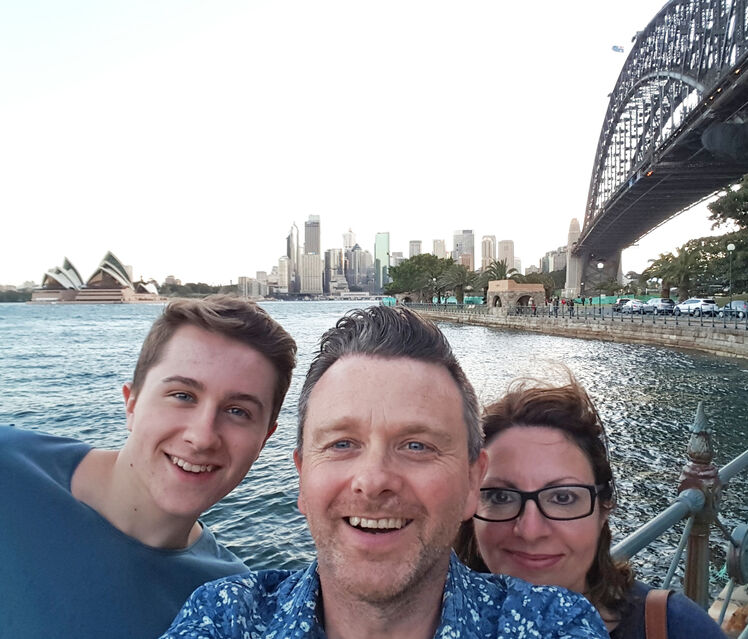An award from the New South Wales Ambulance Service holds pride of place on Jason Davis’ mantelpiece, nestled amongst photos of himself with his wife Anna and son Ollie.
It’s small, clear and non-descript. It’s also emblazoned with ‘Cardiac Arrest Survivor’.
Now 47, Jason has always tried to keep fit, by exercising regularly and trying to eat as healthily as possible. So four years ago, when he first felt a squeezing pain across his chest while cycling around Olympic Park in Sydney, he dismissed it as a pulled muscle. He got in his car and drove home.
“I didn’t realise I was actually having a heart attack until about four hours after it had happened.”
When the pain still hadn’t relented later that day, he went to the hospital. They told him he’d had a heart attack and immediately scheduled him in for an emergency angioplasty, during which he would have a stent placed. The stent, a small stainless steel mesh tube, would be inserted into his blocked coronary artery to help hold it open and improve blood flow to his heart.
The reality didn’t hit Jason until the actual procedure – he was awake while the stent was put in, and watched the progress on the equipment monitors with fascination.
“I could see my artery, and I could see that it was blocked. When the doctor pushed the stent in, I could see all the blood flow going back into the artery, so that probably hit home the most. That was actually my heart, and I could see what had happened to it.”
But Jason’s heart troubles didn’t end there. Six months almost to the day after his heart attack, he was at home on the sofa, talking to his wife – something they’d done thousands of times before. He doesn’t remember anything about what happened next. But Anna does.
One minute they were talking. The next, Jason had stopped responding. He simply lay there, unconscious. He had suffered a sudden cardiac arrest.
“Anna immediately rang 000. The emergency responder was giving her instructions over the phone while I was laid on the floor. Anna and Ollie took it in turns to do CPR on me until the ambulance crew turned up. They kept me alive.”
It’s challenging, coming to terms with your own mortality, and the awareness now of how heart disease could affect his family weighs heavily on Jason. “I think I've definitely become stronger mentally, although it has affected me.”
Jason credits his heart problems for the lifestyle changes he has made since, and often takes the view of ‘before’ and ‘after’.
Before: he had never had a cholesterol test.
After: every year, he has one. Every year, his son has one.
Before: he ran an intensive business that swallowed the majority of his time.
After: he sold the business, took a step back, and focused on the priorities in his life, like his family.
“I can still lead a normal life. I just need to make adjustments to that life. And that means watching what I eat, watching the exercise that I do, just generally being healthy and taking my medication.”
Heart disease is known as a ‘silent killer’, because there can be no warning signs. Jason champions raising awareness of heart disease and its symptoms, and urges people to become more aware of their own health. “I honestly never gave a thought at all to my heart condition because I was fit and healthy. Looking back, if I could relive my time before the event happened, I would take a bigger interest in my heart health.
“Maybe I should have asked my parents whether there was a history of heart disease in my family. Maybe I should have gone and got my cholesterol checked. Maybe, maybe. They’re all the things that you could do to raise your own awareness around early signs that you could possibly have a heart attack.”
Jason is now a staunch supporter of heart research and what it has done to keep him – and thousands of others – alive. “I think what the Heart Research Institute is doing, especially with advancements like 3D bioprinting of hearts, is going to really help me. It’s absolutely amazing.”

Jason's tattoo
How is HRI helping?
HRI is conducting innovative research to develop new therapies for detecting, preventing and treating heart attacks.
Our Coronary Diseases Group is investigating whether the anti-inflammatory drug colchicine, which has already proved safe and effective for treating conditions like arthritis and gout, can be repurposed to protect against repeat heart attacks. A collaboration between the Coronary Disease Group and our Clinical Research Group has also discovered that the heart releases certain substances during a heart attack that can be detected in the laboratory.


